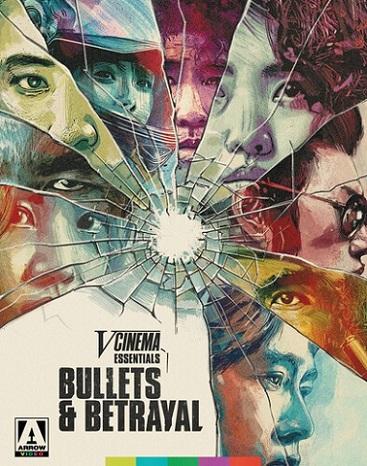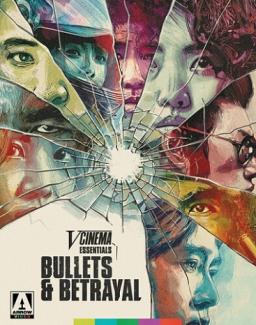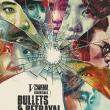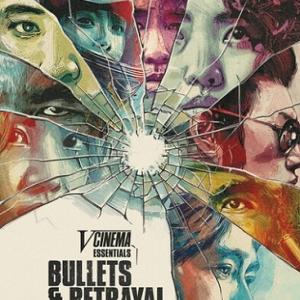Exploring Japan’s V-Cinema
V-Cinema Essentials: Bullets & Betrayal (Japan, 1989-1994, Arrow Video, 5 Blu-rays, 9 Films, NR, 795 min.). This set of Japanese crime films is from the legendary Toei Studios, which began producing movies for VHS and other home video formats under their V-Cinema label in 1989. By avoiding the ratings board process for a cinematic release, filmmakers working in V-Cinema had creative freedom to be extreme when it came to violence, gore and eroticism. This limited-edition release features nine celebrated titles of the era presented in 1080p and with some special features.
Japan’s box office sales were plummeting towards an all-time low of 122.9 million by 1996. As home video devices became increasingly affordable, nationwide video rentals from some 16,000 stores would total 840 million in 1989. This led Toei Studios, instead of pouring money into big-screen productions, to focus on cheap, eye-grabbing straight-to-video films to fill rental store shelves.
“Crime Hunter: Bullets of Rage” (1989, 58 min., 3 stars) was the first V-Cinema release and introduced the studio’s new approach to films. Two Little Tokyo trigger-happy cops, Joe and Ahiru, raid a motel to arrest Bruce Samarawa (Seiji Matano of this set’s “Burning Dog”), but their getaway is thwarted when their car is shot up by a gang of hoodlums in clown masks. As Samarawa escapes, Ahiru (V-Cinema icon Riki Takeuchi of “Dead or Alive”) takes a shot to the head. Joe (Masanori Sera of “Dr. Akagi”) then wakes up in the hospital with an appetite for revenge.
In the minimalist plot, Joe teams up with Lili (Minako Tanaka of TV’s “Face,” “Ultraman Orb”), a gun-packing nun who wants Samarawa for ripping off $5 million in donations to her church. A highlight of the film is a shootout at the West Side Gang’s nightclub. One twist is the identity of the clown-masked men. The film’s ending is rather bleak.
Extras include an interview with director Shundo Okawa (18:24) and a video essay by Tom Mes on the film and the dawn of V-Cinema (13:09).
Next is “Neo Chinpira: Zoom Goes the Bullet” (1990, 85 min., 3.5 stars). According to Japanese film critic Masaid Tanioka, who does a brief – 3:30 to 4:47 – on-camera introduction to each film (and owned a video rental store back then), this film expands on one scene from “Battles without Honor and Humanity” (1973) as an homage. The film has the same kind of action as “Crime Hunter: Bullets of Rage,” but adds some humor.
Junko (Show Aikawa, who became a star through V-Cinema and also is in this set’s “Danger Point: The Road to Hell”) has dreams of being a tough yakuza, even though he is like the court jester of his clan, especially to his uncle Junichi (Joe Shishido of “Branded to Kill,” “Youth of the Beast”). Junko mostly serves as a club restroom attendant or a chauffeur. One night, he is given use of his boss’ American car, but it is “borrowed” by Yumeko (Chikako Aoyama of “Two Punks,” “Robotrix”). The pair ultimately hook up, leading to some nudity, including a bubble bath scene.
When revenge against a rival yakuza gang is needed, Junk is one of three men assigned the task. However, two of the men “zoom” to avoid resulting jail time. One even shoots himself in the stomach during a rollercoaster ride. This leaves Junko to be the assassin. Aikawa is a likable actor.
The extra is an interview with writer-director Banmei Takahashi (15:14).
Disc two contains “Stranger” (1991, 89 min., 3 stars), the story of Kiriko (Yuko Natori of “Crest of Betrayal”), a bank worker who is charmed by man into embezzling $11,000 for him. Now years later, she is a night-shift taxi driver, who is suddenly being followed by a scuffed-up black Toyota Land Cruiser. In what seems to use portions of “Taxi Driver” and even more so “Duel,” her stalker up his game in dangerous fashion – once attacking her when a passenger and throwing a hammer through her apartment window, leaving a dead dog on her bed and finally attacking her cab with his Land Cruiser.
To offset the danger of the stalker, Kiriko interacts with a young boy passenger, who eventually asks her to date him. There are several good action scenes.
The extra is an interview with writer-director Shunichi Nagasaki (18:01).
Disc two also has “Carlos” (1991, 91 min., 3.5 stars). Carlos (comedian Naoto Takenaka of “Nowhere Man,” “Shall We Dance?”) is a criminal from Brazil who has relocated to Japan after killing eight policemen. In Japan, Carlos is contending against two yakuza gangs. The film, based on a manga by Kazuhiro Kiuchi, is very violent, with lots of blood.
Carlos kills two members of one gang, but the Hayakawa gang believes their rival gang was responsible. The ailing Hayakawa head says whoever kills the rival gang leader will become his successor. In a twist, Carlos is hired to kill Hayakawa, but the other gang’s American assassin (Chuck Wilson of “Godzilla vs. King Ghidorah”) does the deed first.
At one point, Carlos’ men wipe out a whole yakuza baseball team. In all, there are some 32 deaths. The showdown of a man with a gun versus a man with a sword mirrors a scene in the Indiana Jones film “Raiders of the Lost Ark.”
The extra is an interview with writer-director Kazuhiro Kiuchi (20:17).
Disc three has “Burning Dog” (1991, 103 min., 3 stars), which begins with a gang preparing stolen money to mail to Hong Kong for laundering. However, then in this 10-minute prologue, Numabukuro shoots the other three. However, Shu (Seiji Matano, who here looks like Gene Simmons of Kiss) survives and Numabukuro’s car is attacked, flipped and burned. However, now Shu needs a passport so he can go to Hong Kong to reclaim the loot.
Shu then meets Takuji on the beach. Takuji works in maintenance at the U.S. Marine base Camp Norman, which he wants to rob as it processes pay for the U.S. military in several countries. He says there should be $20 million. While the heist is successful, there is tension among the robbers, with Takuji’s woman Ryoko also trying to bed younger Koji.
The film has several double-crosses, and is supposedly based on an actual 1965 incident. There also are multiple flashbacks to a robbery 10 years previously. The extra is an appreciation by critic Mark Schilling (15:55).
The second film on disc three is “Female Prisoner Scorpion: Death Threat” (1991, 90 min., 3.25 stars). This film is part of a popular series, which originally began with four films in 1972-73. The film starts with a woman crawling out of a barrel of goo, which we later learn was not-yet-hardened cement. Then, the opening credits come with a title song, before the woman is shown assassinating two men. This woman (Naoko Amihama) then is hired to infiltrate a female prison to kill Scorpion, who has illegally been detained, chained up underground for 20 years. The former warden, who would be in trouble if this act was revealed, is currently a politician, running for higher office.
The film has plenty of women in prison scenes, including a nude duo to attract a guard’s attention in an escape attempt, and a lot of whipping of the assassin after she starts an earlier fight. Things become more complicated when the woman she was sent in to kill claims she is not the Scorpion.
The film, directed and co-written by Toshiharu Ikeda, has a late fantasy element. As mentioned, there are plenty of violent scenes, with Amihama having to put up with a lot of abuse. The extra is an appreciation by Samm Deighan (12:08).
Disc four starts with “The Hitman: Blood Smells Like Roses” (1991, 84 min., 3.25 stars), which stars Hideki Saijo, who, as a teenage singer of some renown, had a hit with “Young Man,” a Japanese version of the Village People’s “YMCA.” Here, he plays former police trainee Takanashi, out to avenge the murder of his fiancée Reiko, who was held as a shield by a yakuza member during a restaurant shootout between two rival gangs, the Kumasa and Mitsuyoshi families.
We first see him kill three men who are attempting a gang rape of a woman picked up in a bar. Oddly, the male trio includes a father and son. Takanashi soon is picking off members of each gang, hoping to launch them into all-out warfare.
One day, a girl (Natsumi Nanese as Rumi) steals his gun case. He is able to track her down and they actually begin to work together. One trick Takanashi has is throwing dynamite sticks towards his targets and the shooting the sticks so they explode. In one scene, some of the baddies get run over by a truck.
The film is directed by Teruo Ishii. The extra is an appreciation by critic Frankie Balboa.
Disc four also contains “Danger Point: The Road to Hell” (1991, 100 min., 3 stars), which is a buddy film, starring Show Aikawa as Ken and Joe Shishido as Joji, contract killers who are jettisoned by their boss, but have a photo of a nurse from their last job. Tracking the nurse leads them to learn their last kill was a police detective and that there is $20 million in loot from a bank robbery being offered at half price.
It is another film filled with betrayals. I counted at least five double-crosses. At one point, the bank robbers’ car gets crushed, with them inside it.
Aikawa and Shishido also co-starred in “Neo Chinpira: Zoom Goes the Bullet.” This film was directed and co-written by Yasuharu Hasebe. The extra is an appreciation by critic James Balmont.
Finally, on disc five, is the weakest of the nine films. “XX: Beautiful Hunter” (1994, 89 min., 2 stars) stars Makiko Kuno as Shion, a trained assassin for a fanatical religious order. The often-sick film shows Shion being forced into her first kill as a child.
Jumping forward 10 years, we next see Shion kill eight or so in a house, including a political power broker. The maid escapes, but is tracked down and killed, with this latter bit captured on film by two journalists. Shion kills one immediately, then tracks down the second, but as he pleads for his life, it turns into a sex scene. The rest of the film is similarly messy, including Shion pleasuring herself with a revolver.
Soon Shion and the photo journalist are lovers and the religious order’s leader orders both to be killed. The film is kind of all over the place, and not in a good way. One time Shion is captured, hosed and whipped while hanging by her wrists and subjected to electric shock.
The first half of the film is better; the rest not even worth watching. It was directed by Masaru Konuma, who made his name helming several “Roman Porno” productions for Nikkatsu studios. It was co-written by Hiroshi Takahashi, who would go on to write the horror film “Ringu.”
Extras include an interview with Takahashi (17:39) and an appreciation by critic Patrick Macias (19:01).
Rating guide: 5 stars = classic; 4 stars = excellent; 3 stars = good; 2 stars = fair; dog = skip it
The Magnificent Chang Cheh: The Magnificent Trio and Magnificent Wanderers (Hong Kong, 1966, 1977, Eureka!, Blu-ray, NR, 108, 98 min.). Chang Cheh was one of the Shaw Brothers Studio’s most prolific directors. Known as the “Godfather of Hong Kong Cinema,” he was the filmmaker behind “Five Deadly Venoms,” “Chinatown Kid” and “Boxer Rebellion.”
In “The Magnificent Trio,” made during the period when wuxia films ruled the Hong Kong box office, Jimmy Wang Yu, who went on to fame in Chang’s “The One-Armed Swordsman,” plays swordsman Lu Fang. Lu is joined by warriors Yen Tzu-ching (Lo Lieh of “Five Fingers of Death,” “The 36th Chamber of Shaolin”) and Huang Liang (Cheng Lui of “Sacred Knives of Vengeance”) to help a group of oppressed farmers, who had resorted to kidnapping the local magistrate’s daughter so he would reduce their tax burden as there had been many years of drought. The farmers are led by Gao Bao.
The magistrate sends a couple dozen troops to rescue his daughter. Some are killed and half retreat, so the magistrate hires prisoners to get her back. At this point, Huang also was jailed, but only because he needed food and a place to sleep. When a farmer carrying bags of rice is killed, it upsets Huang, who then choses to help Lu, who used to be his master, and the farmers.
The film, the fifth directed by Chang, includes two ill-fated romances. There is lots of swordplay and the magistrate’s soldiers use arrows. The film was a remake of Japan’s “Three Outlaw Samurai” (1964). The extra is audio commentary by Frank Djeng and Michael Worth.
“Magnificent Wanderers” has plenty of familiar faces, but it fails as a kung fu comedy. Fu Sheng (“Shaolin Temple,” “The Shaolin Avengers”) plays Lu Shao You, a street fortune teller, who is aided by friends Shi Da Yong (Chi Kuan-chun of “The Green Jade Statuette”) and Guan Fei (Li Yi-min of “The 7 Grandmasters,” “The Seven Commandments of Kung Fu”). Guan Fei is good with a rope and gymnastics.
The trio attempt to join Chinese patriots in their struggle against the invading Mongol armies. They are helped by wealthy Chu Tie Xia (David Chang of “Five Shaolin Masters,” “Dynasty of Blood”). Chu uses a bow to fire gold pellets as weapons instead of arrows. He has used most of his inheritance to help refugees and those fighting the Mongols. In one scene, the three friends use hot cooking oil as a weapon.
Weirdly, the action stops for a bit as the three demonstrate their kung fu skills against some soldiers at an army camp. It makes no sense.
Extras include audio commentary by Mike Leeder and Arne Venema; and a video essay by Gary Bettinson, editor-in-chief of the Asian Cinema journal, on Chang’s style (29:20). Grades: The Magnificent Trio 3.25 stars; Magnificent Wanderers 2.5 stars; extras 3 stars
About this blog:

My music review column, Playback, first ran in February 1972 in The Herald newspapers of Paddock Publications in Arlington Heights, IL. It moved to The Camden Herald in 1977 and to The Courier Gazette in 1978, where it was joined by my home video reviews in 1993. The columns ran on VillageSoup for awhile, but now have this new home. I worked at the Courier Gazette for 29 years, half that time as Sports Editor. Recently, I was a selectman in Owls Head for nine years.
























